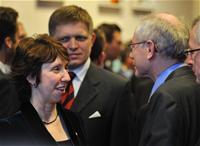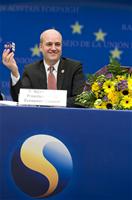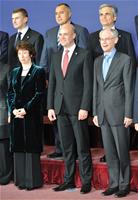Honestly and personally about the new European president
Adelina Marini, November 20, 2009
 I have to admit that last night after I found out who the European leaders elected for president of the EU, I was disappointed. My expectations were different - not only regarding the personality of the first European president but also about the election process itself. I had predisposed myself for long and painful negotiations that would have continued the whole night at least as it had happened before for less important issues. The way the whole world watches the chimneys in the Vatican, expecting to see what colour the smoke of the conclave would be when they chose a pope, the same way I wanted more solemnity, more suspicion.
I have to admit that last night after I found out who the European leaders elected for president of the EU, I was disappointed. My expectations were different - not only regarding the personality of the first European president but also about the election process itself. I had predisposed myself for long and painful negotiations that would have continued the whole night at least as it had happened before for less important issues. The way the whole world watches the chimneys in the Vatican, expecting to see what colour the smoke of the conclave would be when they chose a pope, the same way I wanted more solemnity, more suspicion.
Furthermore, literally the whole world watched the building of the European Council in Brussels, expecting to hear the sacred names. Because issues like climate change, Iraq, Afghanistan, the Caucasus, the relations with Russia, the nuclear programme of Iran, the conflict in the Middle East are all global problems that often need a swift reaction. Instead, as it usually happens, the swift reaction comes from separate EU member states. This makes the Union interesting only in terms of the largest market in the world.
This is the reason why today I felt as if I got for my birthday clothes instead of a toy - what  should I do with them? I can neither share them with my fellow kids to play a game with them, nor can I feel happy about them. For me this has always been a bland present, true - a practical one, but still blant.
should I do with them? I can neither share them with my fellow kids to play a game with them, nor can I feel happy about them. For me this has always been a bland present, true - a practical one, but still blant.
I don't know the work of Herman van Rompuy and that is why I shouldn't create a negative perception of him before I've seen what he would do. After almost 45 minutes discussion with journalists in Brussels, I'm disappointed again.
It felt strange to me that Mr. Herman van Rompuy will keep the same media discretion as he has so far in his work. How should I take this? How discrete can be the search of a compromise on a EU common position on the situation in Afghanistan? Or the construction of new settlements in East Jerusalem? Baroness Catherine Ashton spoke in the same spirit saying that she will continue the method of work of her predecessors Benita Ferrero-Waldner and Javier Solana and that is - the silent diplomacy. Not that I d not agree that sometimes this type of diplomacy is preferable but a little bit of elaboration wouldn't have been redundant.
My whole feeling from the press conference was of a hard compromise being achieved and none of the sides remained happy. But in his speech, Herman van Rompuy explained that the search of a compromise means exactly the opposite - when everyone will be happy and there won't be winners and defeated. In the meantime he did not look as the happiest man, elected the first president of the EU and baroness Ashton said abruptly responding to a question, that it would be better if she was judged by her deeds from that moment on and not for the lack of practical experience in her current career.
But my biggest disappointment came from the admission which I suspected for a long time that, in fact, the Lisbon Treaty will not make of the EU what everyone expects - stronger, more integrated global leader or, at least, a player. This happened after Mr. Van Rompuy was asked to share his opinion about the EU membership of Turkey. "My personal opinion is totally subordinate to the visions of the Council. It does not matter what I think because my role, which the Treaty gives me, is to find consensus on all issues, including that one. My personal visions are irrelevant in my new role".
The logical next question was asked by the Brussels correspondent of the German news agency DPA: "Henry Kissinger allegedly said he did not know who to call to call Europe. We have here the rotating president of the Council, the new president of the Council, the high representative and the president of the Commission. Which of you will Barack Obama be calling to reach Europe and which of you will call Barack Obama when Europe wants to talk to him?"
The answer of Van Rompuy: "I am anxiously waiting for the first phone call".
The answer of the Swedish prime minister Fredrik Reinfeldt: "I can't add anything to that" (laughing)
The most serious and indeed realistic was the president of the Commission Jose Manuel Durao Barroso: "We have to accept one fact that it is important - we are a Union of states not one country. We are not the United States, we are not China, we are not Russia and we do not want to be. So, by definition our system is more complex than other systems that are fully integrated. And we have this double legitimacy in Europe that we have to understand. So, on some issues it is the European Council that represents the European Union and on some other is, of course, the European Commission as a supranational institution. Some people do not understand supranational institutions but we keep on explaining to them".
After this honest and true explanation I got reconciled. I wanted to know who will be the first meeting of the president and the foreign minister with after they take power on the 1st of December but I realised that this does not matter. Because Mr. Van Rompuy will go to those meetings only when he has something to say. And that will become clear when the leaders of the Eu member states have reached consensus on an issue.
 I am trying to explain to myself why have I expected more. Maybe because as a citizen of a small, corrupt and still untransitioned state from the former Socialist camp, where the prime minister has not even read the Lisbon Treaty and the finance minister refuses to give interviews with the threat that the journalist had not paid his social securities, I simply did not want to accept that the EU is just an economic union. The foreign policy will remain a priority of the national governments, the internal European politics will again be a subject of national interests grazing. And in such a situation a country like mine will always be a loser because it simply is not equal to the others.
I am trying to explain to myself why have I expected more. Maybe because as a citizen of a small, corrupt and still untransitioned state from the former Socialist camp, where the prime minister has not even read the Lisbon Treaty and the finance minister refuses to give interviews with the threat that the journalist had not paid his social securities, I simply did not want to accept that the EU is just an economic union. The foreign policy will remain a priority of the national governments, the internal European politics will again be a subject of national interests grazing. And in such a situation a country like mine will always be a loser because it simply is not equal to the others.
This is as if I have an associate who finances me, I steal money from him and lie to him that I work a lot for the common good, and then ask to sit toe to toe with him when negotiating with another company and to insist to be active in the politics of our company. This cannot happen. Maybe, this speaks badly for me that it is now that I realised this fact. But, at least, I admit it.
And beyond my personal opinion, the election of a president and a foreign minister of the EU was not welcomed by the parliamentary group of the Greens and the European Free Alliance who said in a statement that the European leaders have elected low profile people for EU's top jobs. The Co-President of the group Daniel Cohn-Bendit added: "EU leaders have continued the job of weakening the EU institutions. They have followed their weak choice of Commission President with a bland Council President and an unremarkable foreign affairs high representative. Europe is sinking to a low. The good news is that things can only get better".
The other parliamentary groups still have not reacted officially to the election but the Bulgarian MEP from the group of the Socialists and Democrats and former foreign minister of Bulgaria Ivaylo Kalfin said what many analysts dared to say: "The options of the EU were two. One is to elect people who are respected, well known persons, famous, who will actually embody the EU. The second option was the one they chose - to elect people who have proved themselves that they can work on difficult issues and to solve them but are relatively unknown for the European public, people who would not overshadow the national leaders".
So, maybe the analyst Mark Leonard from the European Council for Foreign Relations will prove right in his forecast 2 years ago, which was that it is not that bad if we have a Europe of two speeds or many unions within the union.